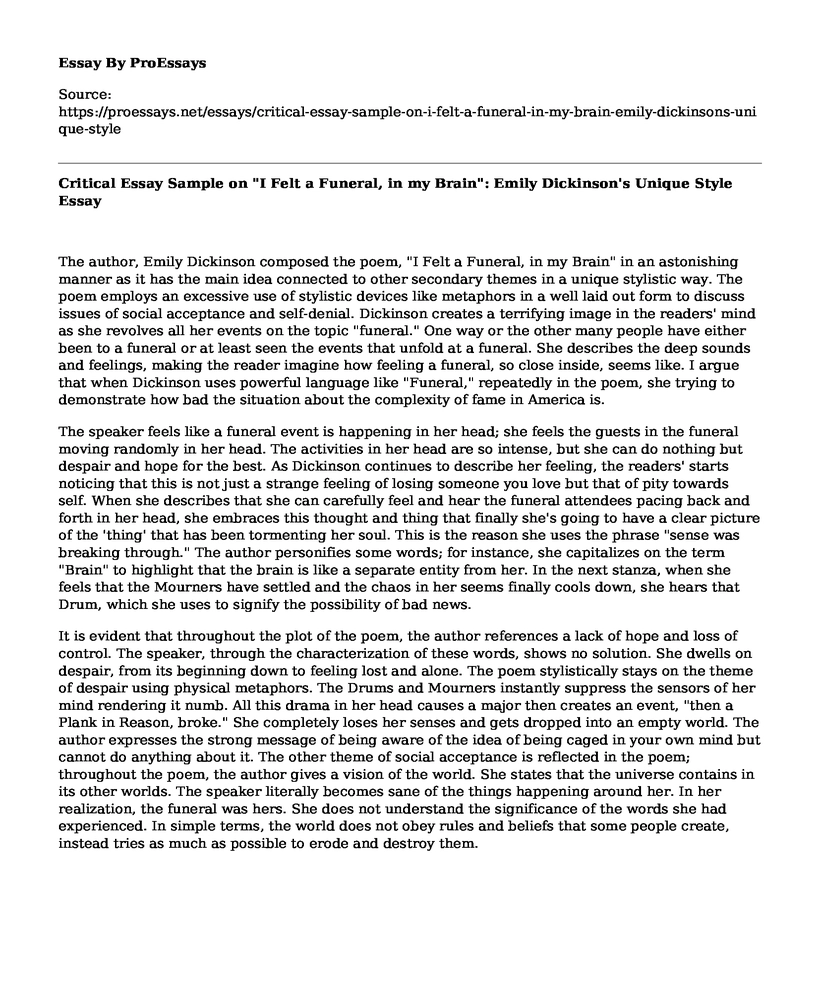The author, Emily Dickinson composed the poem, "I Felt a Funeral, in my Brain" in an astonishing manner as it has the main idea connected to other secondary themes in a unique stylistic way. The poem employs an excessive use of stylistic devices like metaphors in a well laid out form to discuss issues of social acceptance and self-denial. Dickinson creates a terrifying image in the readers' mind as she revolves all her events on the topic "funeral." One way or the other many people have either been to a funeral or at least seen the events that unfold at a funeral. She describes the deep sounds and feelings, making the reader imagine how feeling a funeral, so close inside, seems like. I argue that when Dickinson uses powerful language like "Funeral," repeatedly in the poem, she trying to demonstrate how bad the situation about the complexity of fame in America is.
The speaker feels like a funeral event is happening in her head; she feels the guests in the funeral moving randomly in her head. The activities in her head are so intense, but she can do nothing but despair and hope for the best. As Dickinson continues to describe her feeling, the readers' starts noticing that this is not just a strange feeling of losing someone you love but that of pity towards self. When she describes that she can carefully feel and hear the funeral attendees pacing back and forth in her head, she embraces this thought and thing that finally she's going to have a clear picture of the 'thing' that has been tormenting her soul. This is the reason she uses the phrase "sense was breaking through." The author personifies some words; for instance, she capitalizes on the term "Brain" to highlight that the brain is like a separate entity from her. In the next stanza, when she feels that the Mourners have settled and the chaos in her seems finally cools down, she hears that Drum, which she uses to signify the possibility of bad news.
It is evident that throughout the plot of the poem, the author references a lack of hope and loss of control. The speaker, through the characterization of these words, shows no solution. She dwells on despair, from its beginning down to feeling lost and alone. The poem stylistically stays on the theme of despair using physical metaphors. The Drums and Mourners instantly suppress the sensors of her mind rendering it numb. All this drama in her head causes a major then creates an event, "then a Plank in Reason, broke." She completely loses her senses and gets dropped into an empty world. The author expresses the strong message of being aware of the idea of being caged in your own mind but cannot do anything about it. The other theme of social acceptance is reflected in the poem; throughout the poem, the author gives a vision of the world. She states that the universe contains in its other worlds. The speaker literally becomes sane of the things happening around her. In her realization, the funeral was hers. She does not understand the significance of the words she had experienced. In simple terms, the world does not obey rules and beliefs that some people create, instead tries as much as possible to erode and destroy them.
Cite this page
Critical Essay Sample on "I Felt a Funeral, in my Brain": Emily Dickinson's Unique Style. (2023, Apr 08). Retrieved from https://proessays.net/essays/critical-essay-sample-on-i-felt-a-funeral-in-my-brain-emily-dickinsons-unique-style
If you are the original author of this essay and no longer wish to have it published on the ProEssays website, please click below to request its removal:
- Killings by Andre Dubus Essay Example
- The Great Gatsby in the Perspective of Fitzgerald's Life Essay
- "Hands" by Sherwood Anderson Essay Example
- Essay Sample on Characterization in Literary Works: Role of Characters in Play 'Hamlet' by Shakespeare
- Essay on Frankenstein and Blade Runner: Examining Themes of Technology and Humanity
- Essay Example on Stealing Buddha's Dinner: Bich Nguyen's Memoir of Refugee Life in Grand Rapids
- Book Review Sample on 'The Miser': Greed, Love & Dubious Coincidences







